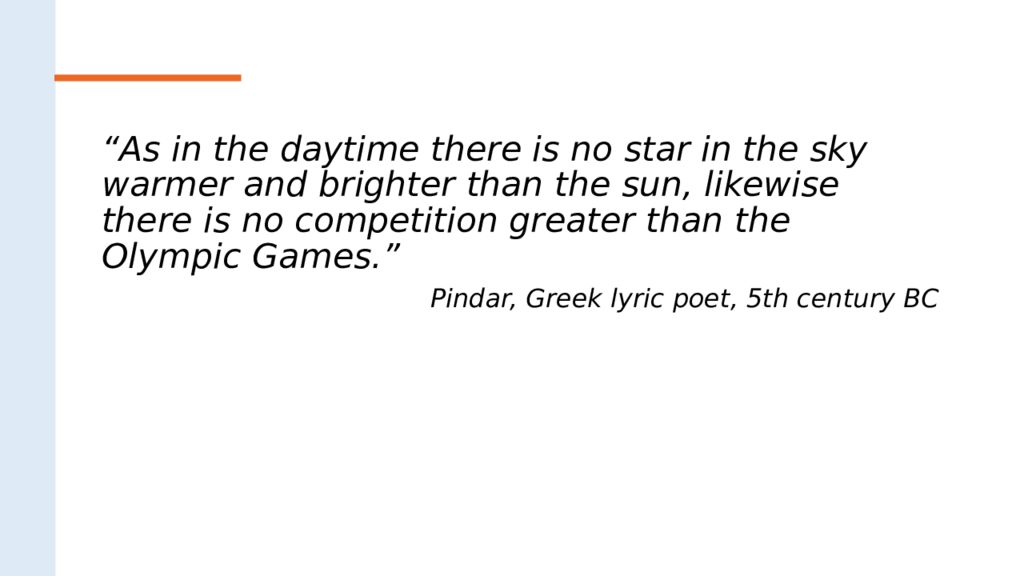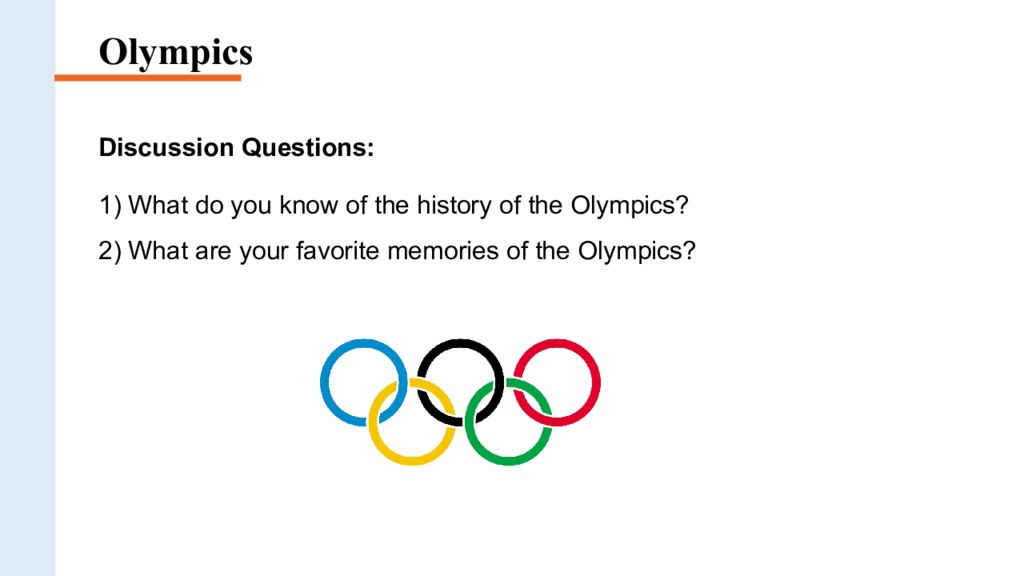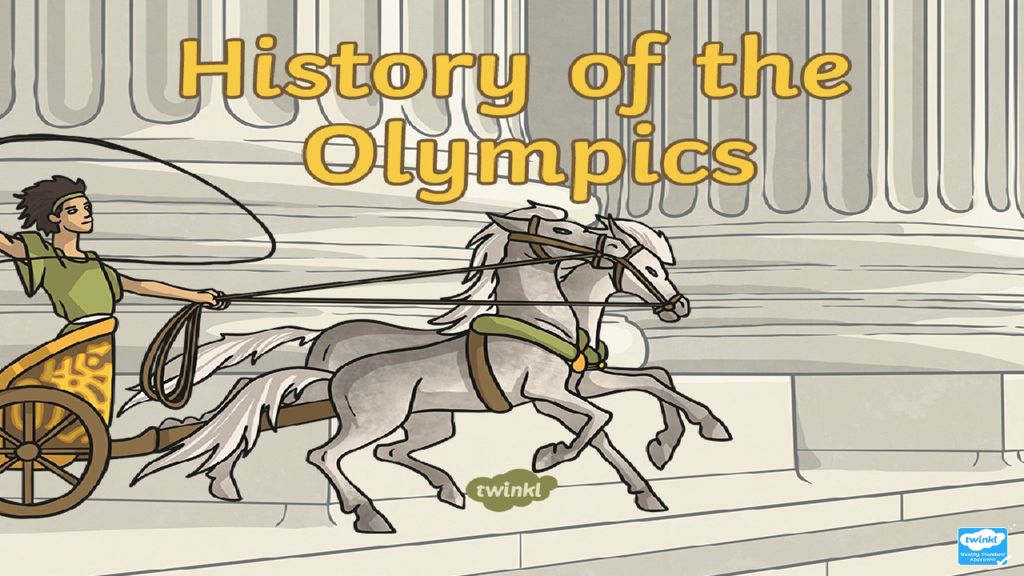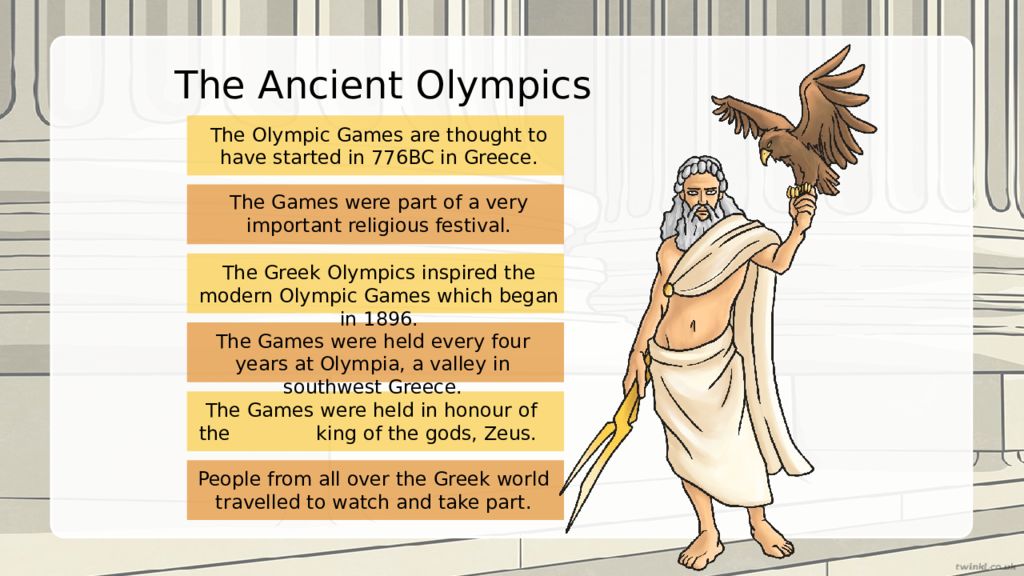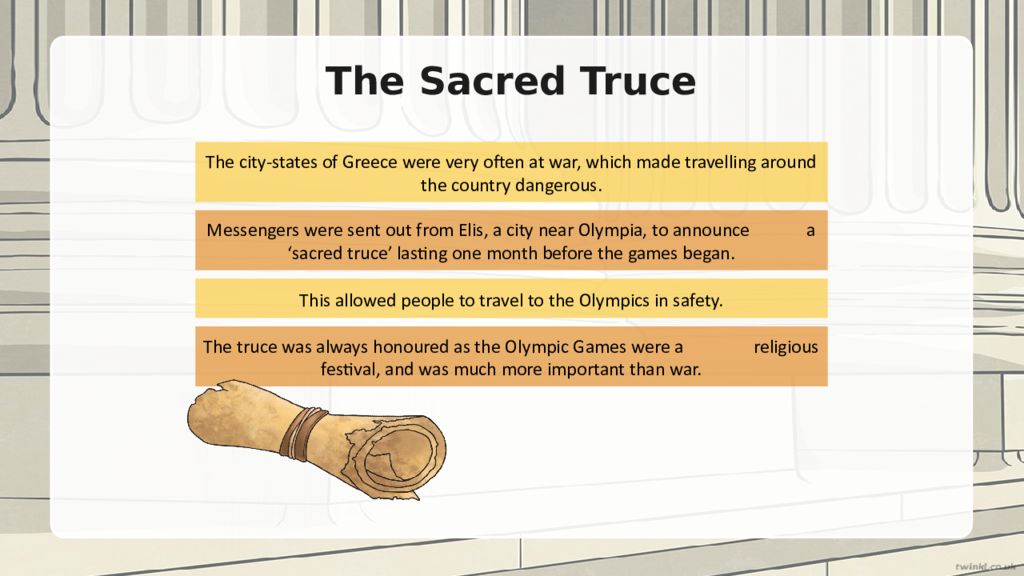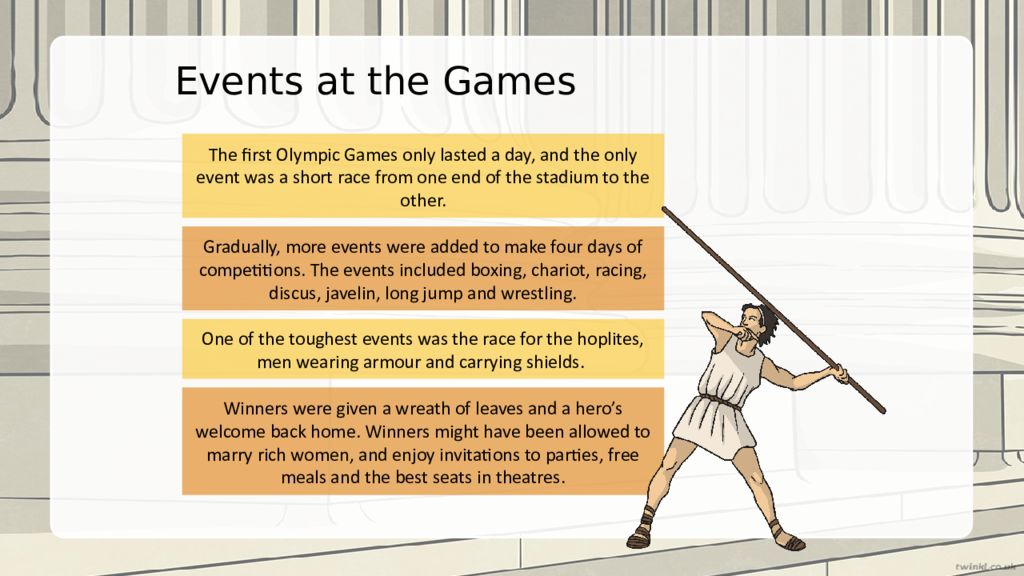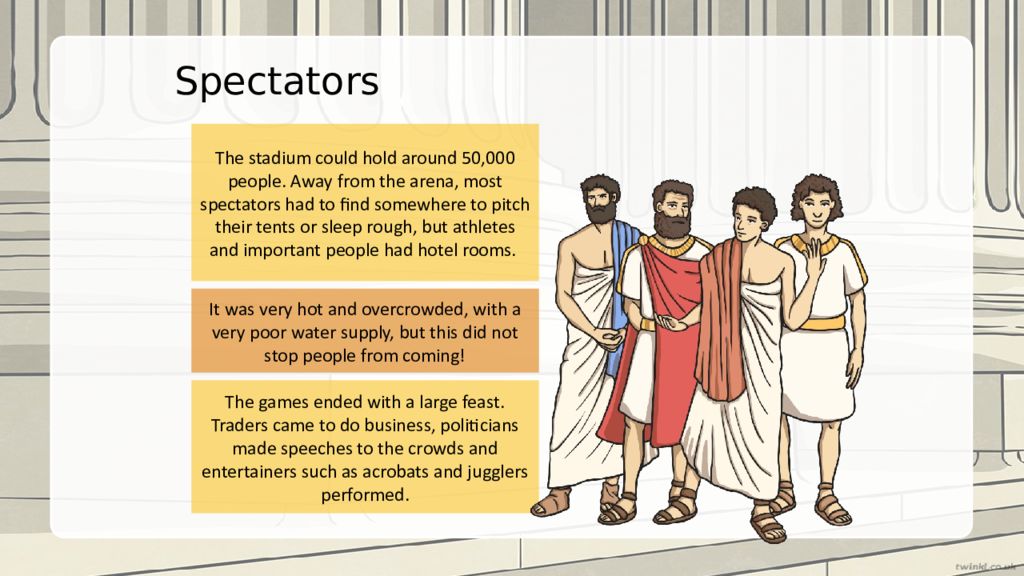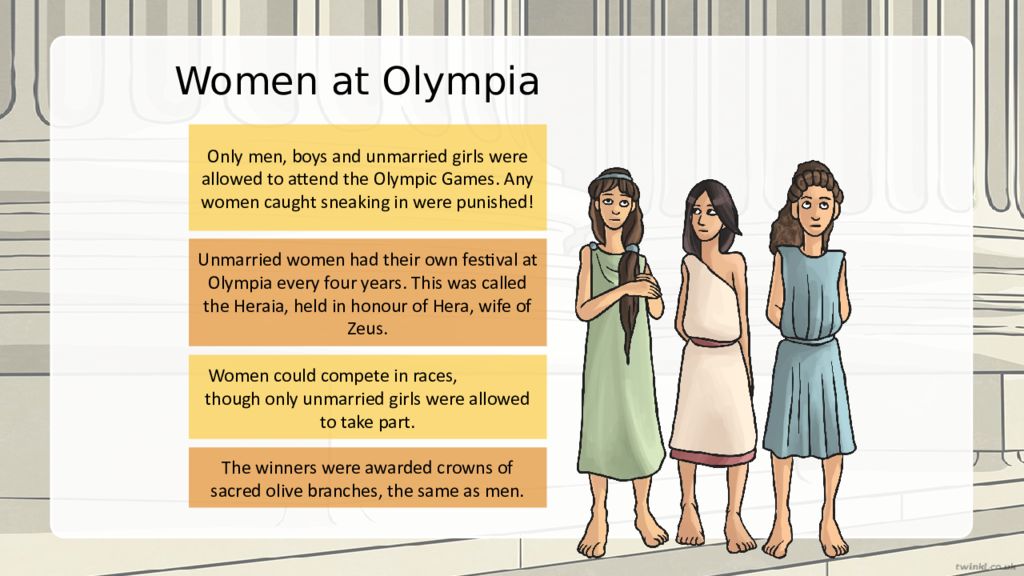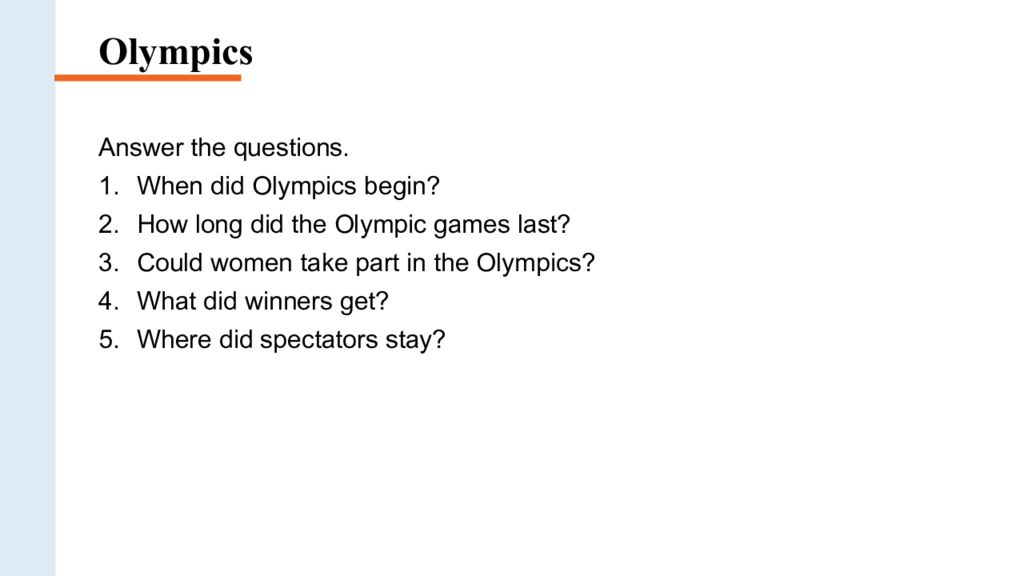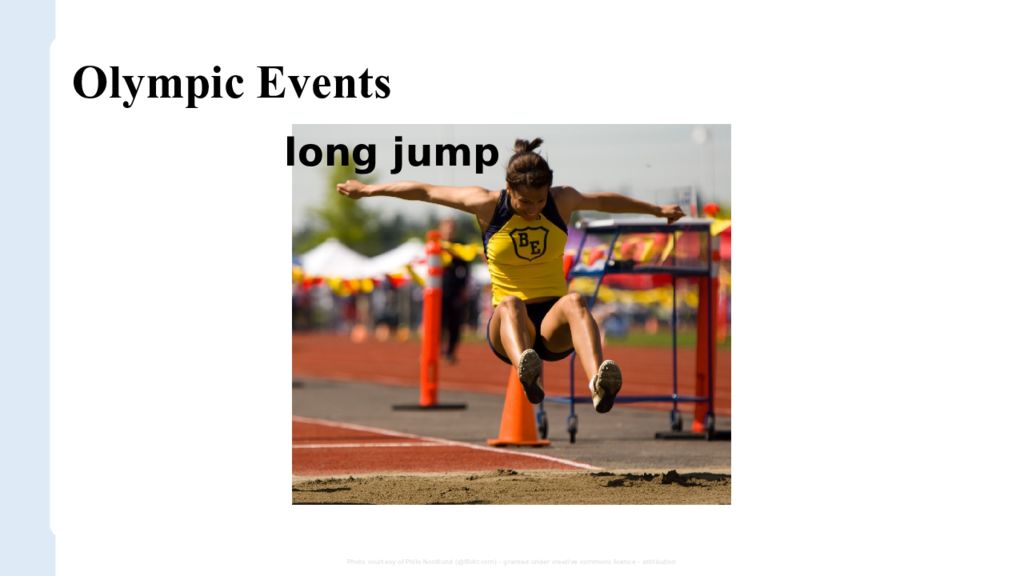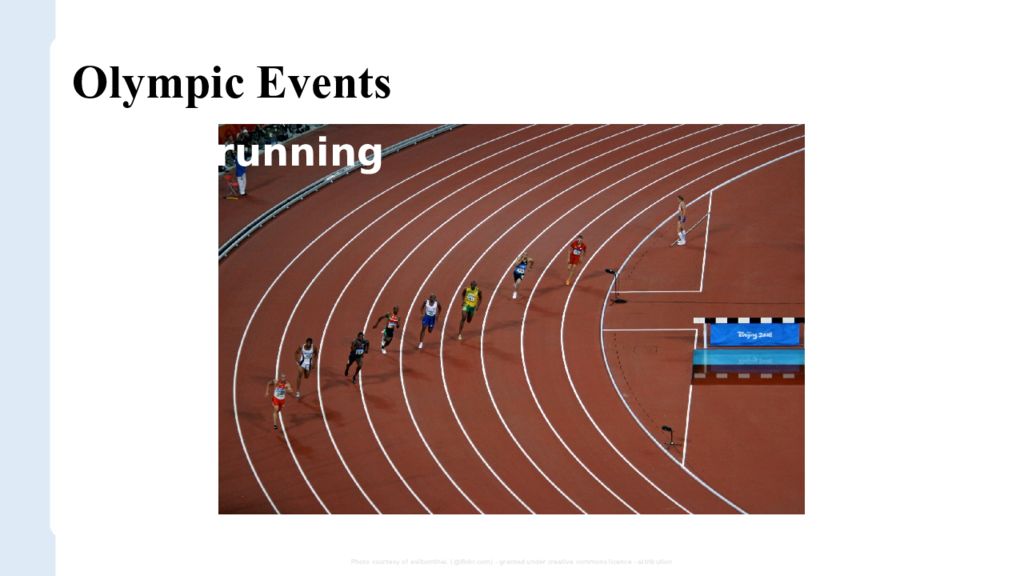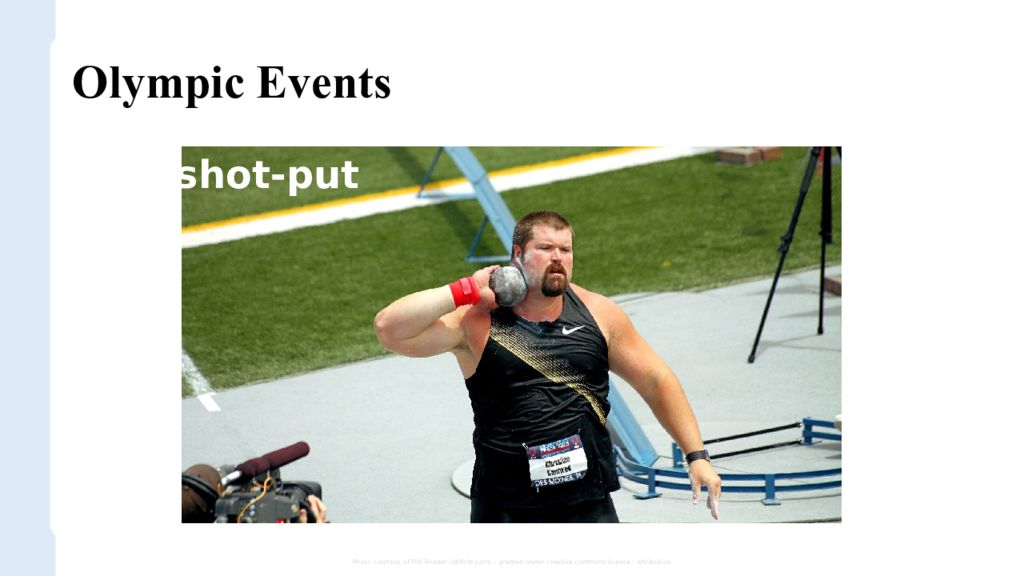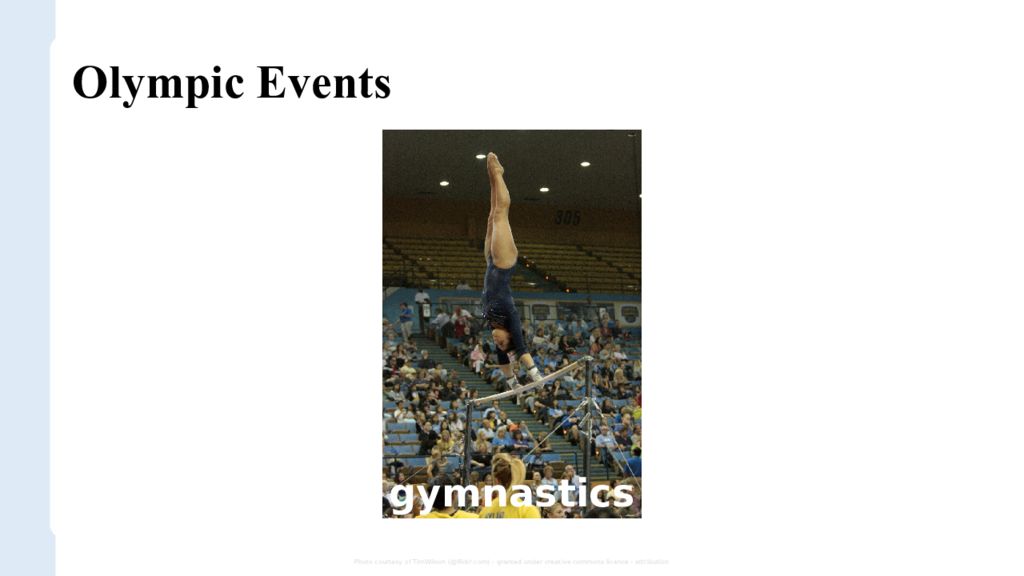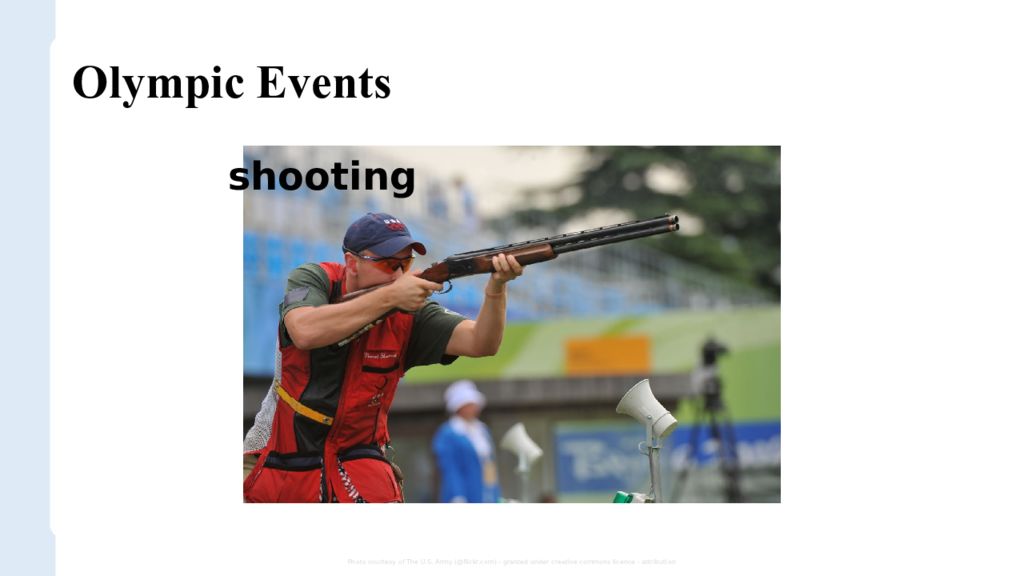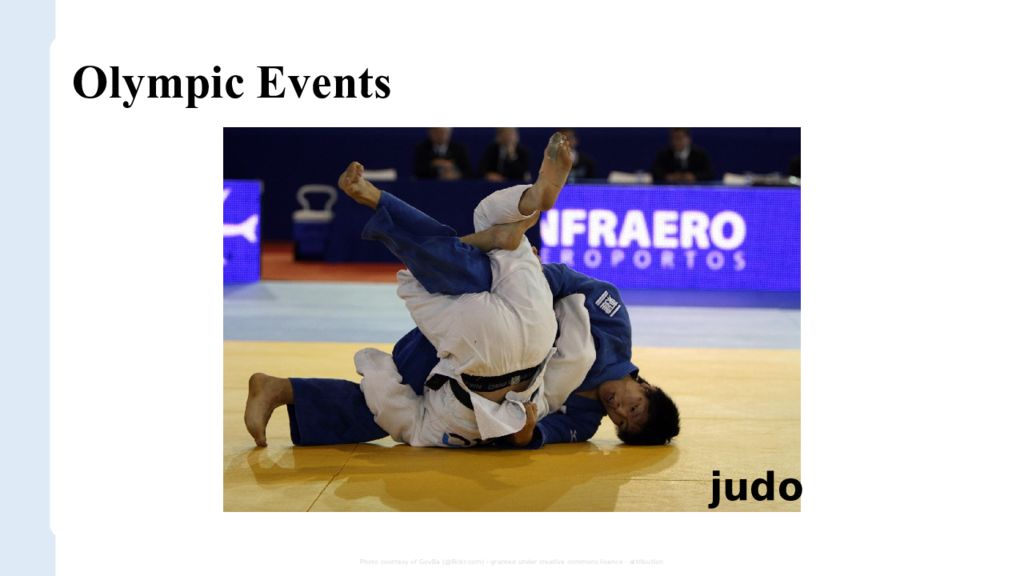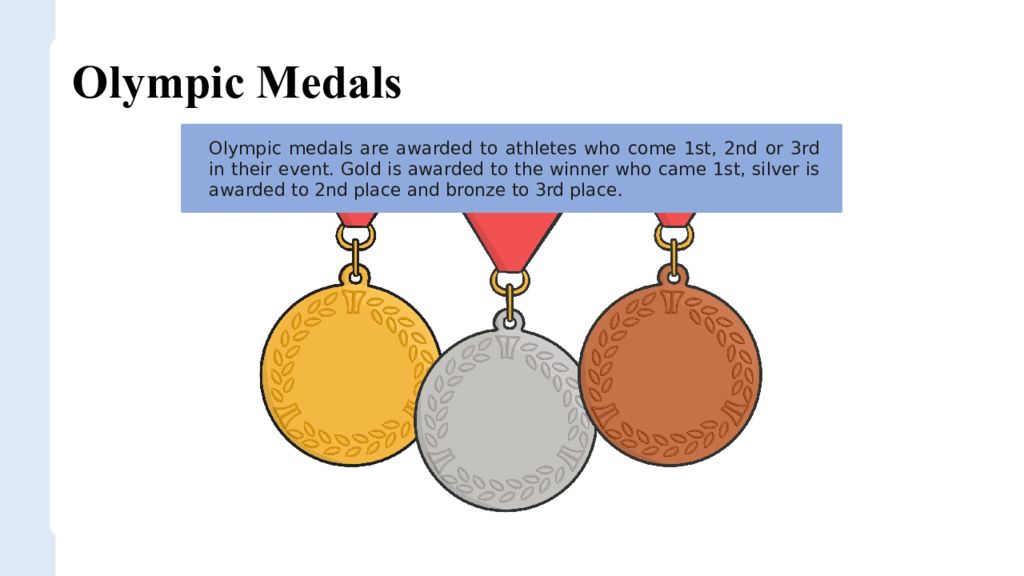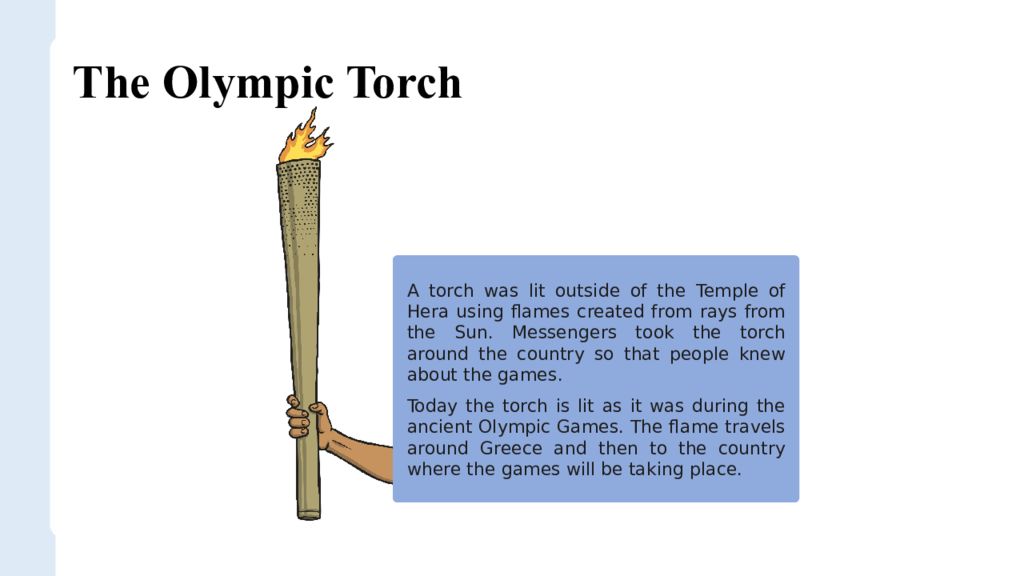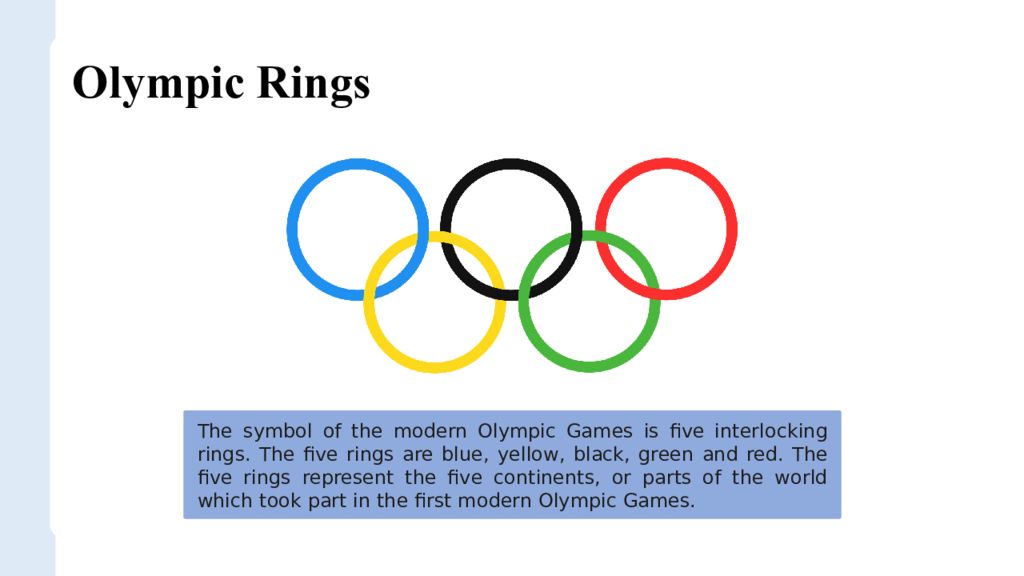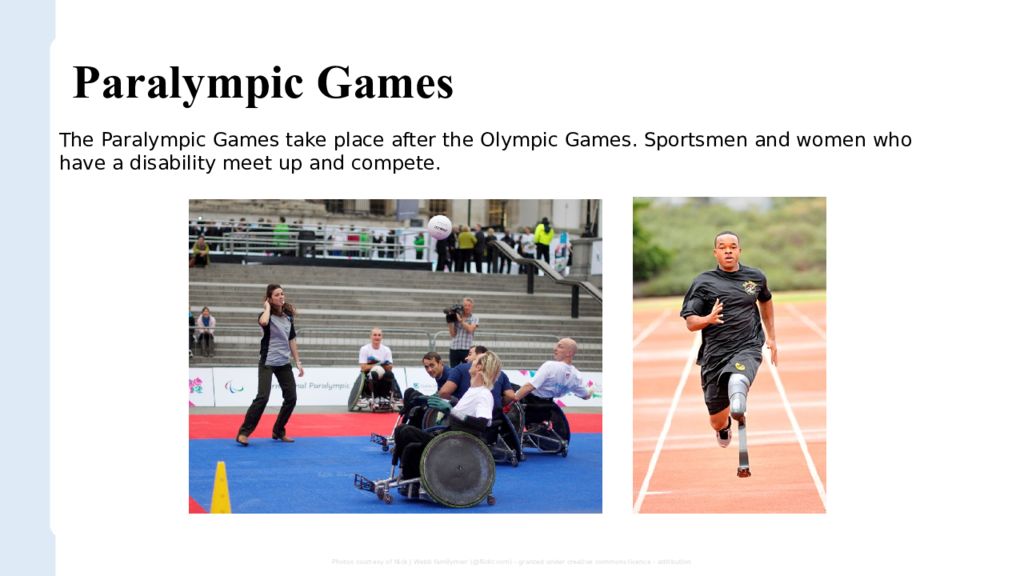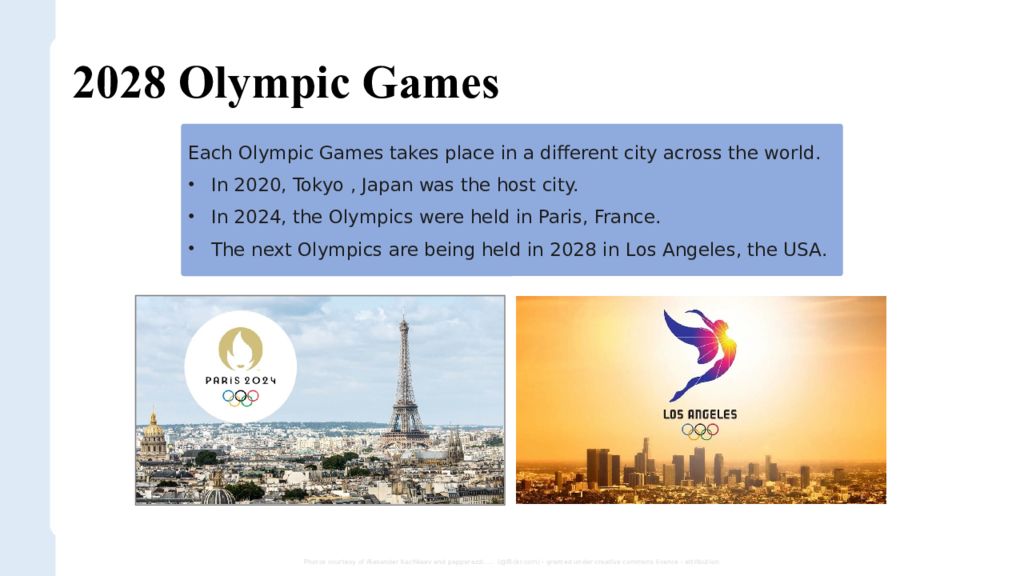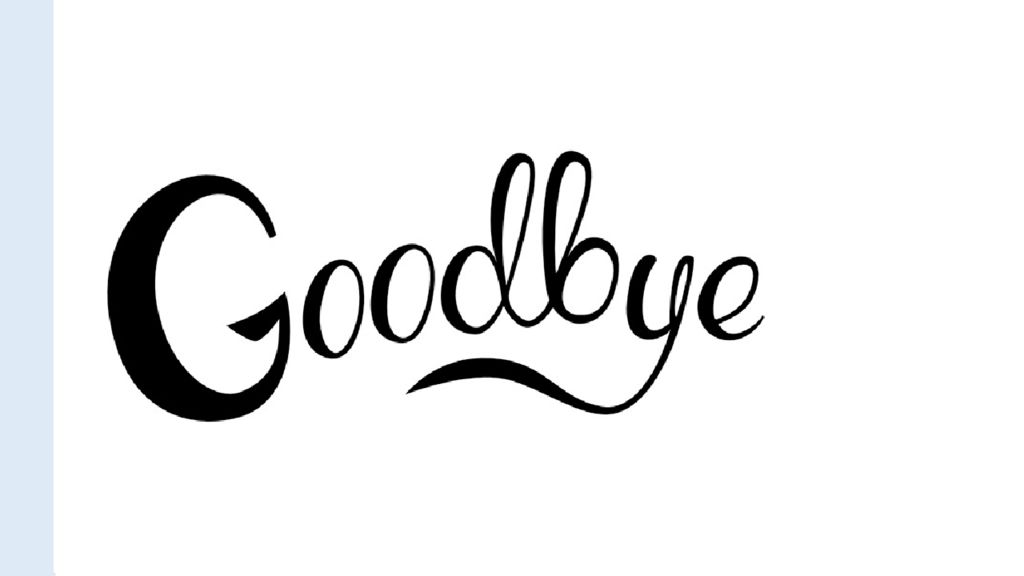Слайд 2
“As in the daytime there is no star in the sky warmer and brighter than the sun, likewise there is no competition greater than the Olympic Games.” Pindar, Greek lyric poet, 5th century BC
Слайд 3: Olympics
Discussion Questions: 1 ) What do you know of the history of the Olympics? 2) What are your favorite memories of the Olympics?
Слайд 4: Vocabulary
to inspire [ ɪnˈspaɪə ] a valley [ ə ˈ vælɪ ] southwest [ saʊ θˈ west] honour [ˈ ɒnə ] to take part [ teɪk pɑːt ] a spectator [ ə spek ˈteɪtə ] The Sacred Truce [ˈ seɪkrɪd truːs ] to announce [ əˈnaʊns ] to last [ lɑːst ] to allow [ əˈlaʊ ] gradually [ˈ græʤʊəlɪ ] a competition [ə kɒmpɪˈtɪʃn ] chariot [ˈ ʧærɪət ] discus [ˈ dɪskəs ] javelin [ˈ ʤævlɪn ] pitch [ pɪʧ ] t ough [ tʌf ]
Слайд 6: The Ancient Olympics
The Olympic Games are thought to have started in 776BC in Greece. The Games were part of a very important religious festival. The Greek Olympics inspired the modern Olympic Games which began in 1896. The Games were held every four years at Olympia, a valley in southwest Greece. The Games were held in honour of the king of the gods, Zeus. People from all over the Greek world travelled to watch and take part.
Слайд 7
Messengers were sent out from Elis, a city near Olympia, to announce a ‘sacred truce’ lasting one month before the games began. This allowed people to travel to the Olympics in safety. The truce was always honoured as the Olympic Games were a religious festival, and was much more important than war. The city-states of Greece were very often at war, which made travelling around the country dangerous. The Sacred Truce
Слайд 8: Events at the Games
The first Olympic Games only lasted a day, and the only event was a short race from one end of the stadium to the other. Gradually, more events were added to make four days of competitions. The events included boxing, chariot, racing, discus, javelin, long jump and wrestling. One of the toughest events was the race for the hoplites, men wearing armour and carrying shields. Winners were given a wreath of leaves and a hero’s welcome back home. Winners might have been allowed to marry rich women, and enjoy invitations to parties, free meals and the best seats in theatres. Events at the Games
Слайд 9: Spectators
It was very hot and overcrowded, with a very poor water supply, but this did not stop people from coming! The games ended with a large feast. Traders came to do business, politicians made speeches to the crowds and entertainers such as acrobats and jugglers performed. The stadium could hold around 50,000 people. Away from the arena, most spectators had to find somewhere to pitch their tents or sleep rough, but athletes and important people had hotel rooms. Spectators
Слайд 10: The Pankration
The pankration, or all-in wrestling, was a very nasty event! Cheating was punished. For instance, anyone caught trying to bribe an athlete had to pay for a bronze statue of Zeus! All-in wrestling was very popular. There were hardly any rules! Biting and poking people’s eyes were banned, but some competitors ignored these rules! Boxing was tough too. The fighters wore leather gloves and a boxer was allowed to carry on hitting his opponent even after he’d knocked him to the ground! The Pankration
Слайд 11: Women at Olympia
Only men, boys and unmarried girls were allowed to attend the Olympic Games. Any women caught sneaking in were punished! Women could compete in races, though only unmarried girls were allowed to take part. Unmarried women had their own festival at Olympia every four years. This was called the Heraia, held in honour of Hera, wife of Zeus. The winners were awarded crowns of sacred olive branches, the same as men. Women at Olympia
Слайд 12: Olympics
Answer the questions. When did Olympics begin? How long did the Olympic games last? Could women take part in the Olympics? What did winners get? Where did spectators stay?
Слайд 13: Olympic Events
Photo courtesy of Philo Nordlund (@flickr.com) - granted under creative commons licence - attribution long jump
Слайд 14: Olympic Events
Photo courtesy of eviltomthai. (@flickr.com) - granted under creative commons licence - attribution running
Слайд 15: Olympic Events
Photo courtesy of Phil Roeder (@flickr.com) - granted under creative commons licence - attribution shot-put
Слайд 16: Olympic Events
Photo courtesy of TimWilson (@flickr.com) - granted under creative commons licence - attribution gymnastics
Слайд 17: Olympic Events
Photo courtesy of The U.S. Army (@flickr.com) - granted under creative commons licence - attribution gymnastics shooting
Слайд 18: Olympic Events
Photo courtesy of GovBa (@flickr.com) - granted under creative commons licence - attribution gymnastics judo
Слайд 19: Olympic Medals
Olympic medals are awarded to athletes who come 1st, 2nd or 3rd in their event. Gold is awarded to the winner who came 1st, silver is awarded to 2nd place and bronze to 3rd place.
Слайд 20: The Olympic Torch
A torch was lit outside of the Temple of Hera using flames created from rays from the Sun. Messengers took the torch around the country so that people knew about the games. Today the torch is lit as it was during the ancient Olympic Games. The flame travels around Greece and then to the country where the games will be taking place.
Слайд 21: Olympic Rings
The symbol of the modern Olympic Games is five interlocking rings. The five rings are blue, yellow, black, green and red. The five rings represent the five continents, or parts of the world which took part in the first modern Olympic Games.
Слайд 22: Paralympic Games
The Paralympic Games take place after the Olympic Games. Sportsmen and women who have a disability meet up and compete. Paralympic Games Photos courtesy of Nick J Webb familymwr (@flickr.com) - granted under creative commons licence - attribution
Слайд 23: 2028 Olympic Games
Each Olympic Games takes place in a different city across the world. In 20 20, Tokyo, Japan was the host city. In 20 24, the Olympics were held in Paris, France. The next Olympics are being held in 2028 in Los Angeles, the USA. Photos courtesy of Alexander Kachkaev and papparazzi..... (@flickr.com) - granted under creative commons licence - attribution London Rio

